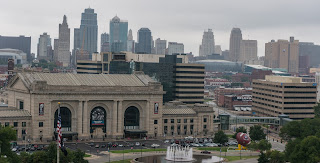When Central moved
from Kansas City, Kansas, which had been its home for 105 years, some critics
(and faithful friends) thought this meant we were turning our back on urban
life. Some suggested that we did not
care about minority populations. Granted, we did move to western Shawnee, a
growing suburb on the southwestern side of the metropolitan area, which is
hardly a white enclave.
Intentionally,
we lodged the seminary within the Central Region of the ABC, our historic and
faithful partner. Deferred maintenance
and innovative mission required us move to a non-residential model of
theological education, and we were able to find a new home.
Yet our love of the city
continued. We first addressed this institutional
move by beginning the Urban Core Initiative that met in churches in Kansas
City, Kansas. It was a way of declaring
that Central has not abandoned its concern to prepare ministers who would serve
in this challenging context where density, diversity, and discouragement
prevail.
This was not enough, however. Under the visionary leadership of Dr. Wallace
Hartsfield II, Central recast its perspective and developed the Urban Missional
Institute. Research, deep conversations,
and thoughtful symposia would invite varied voices to engage critical issues
cities face. Dr. Terrell Carter has brought organizational expertise to this
initiative, and he now serves as the co-director of this arm of Central’s
outreach.
On Friday evening, local pastors,
educators, students, and community activists gathered in Central’s chapel to
hear the prophetic encouragement of Dr. John Perkins. Long in the fray for
civil rights, Dr. Perkins suggested that we are at a wonderful time. He remarked, “I am beginning to hear the same
words in prayer in both black and white churches.” At 87 year of age, he is the harbinger of
hope.
Strongly he reminded us that this racial
divide cannot be solved unless friendship and shared purpose emerge. He believes that his “long longing” is being
fulfilled as white churches begin to understand that the black church emerged
as a result of white oppression. As we
acknowledge our shared brokenness together, he observed, we have the
possibility of getting back together as one people of God.
We all have a stake in caring for
our city, especially when the suffering is so great. Dr. Perkins reminded us that if a black child
lies on the street, we have all failed.
Compassion comes from touch, from drawing near one another and igniting
common cause, which should produce joy.
Making friends that lead us to touch one another is essential.
“Joy should be the energy of the
Christian,” Perkins proclaimed, noting that there is far too little joy
surrounding the greatest story of the coming of the Christ. This is the story, we all agree, that creates
the condition for transformation of our fractious history.
Dr. Perkins is eager to anchor this
generation back into the Gospel and the church, for he rightly fears the
intrusion of individualism. Our
understanding of salvation has neglected that we must participate in God’s
justice-making enterprise as a sign of our faith, for Christianity is
ultimately a behavior.
It has been a good weekend at
Central, and once again we have demonstrated that we care for our city. I trust we will engage in the incarnational
presence needed to serve and learn in our dense diversity.
Molly T. Marshall










No comments:
Post a Comment